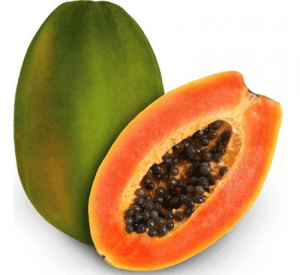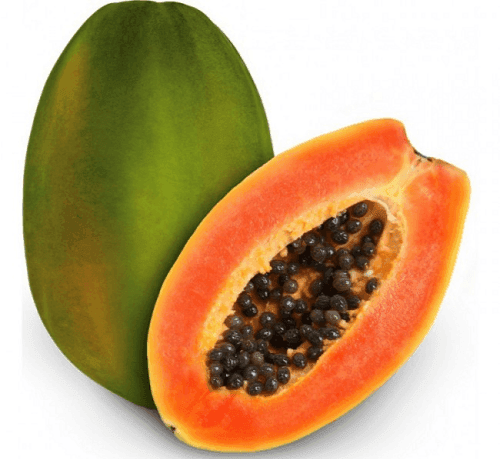Paw paw, also known as papaya, is a tropical fruit that not only delights the taste buds but also offers a variety of health benefits. With its vibrant orange flesh and unique flavor, paw paw is a popular fruit choice worldwide. In addition to being a delicious treat, paw paw is packed with essential nutrients, making it a nutritional powerhouse. Let’s explore the nutritional value of paw paw and its potential uses as an herb.

Nutritional Value of Paw Paw:
1. Vitamins and Minerals: Paw paw is rich in vitamins and minerals that are crucial for overall health. It is an excellent source of vitamin C, which boosts the immune system, promotes collagen production, and acts as an antioxidant. Paw paw also contains vitamin A, E, and K, as well as minerals like potassium, magnesium, and folate.
2. Fiber: Paw paw is a good source of dietary fiber, which aids in digestion, prevents constipation, and promotes a healthy digestive system. Consuming fiber-rich foods like paw paw can also help regulate blood sugar levels and lower cholesterol levels.
3. Antioxidants: Paw paw contains several antioxidants, including carotenoids, flavonoids, and vitamin C. These antioxidants help reduce oxidative stress and combat free radicals in the body, which can contribute to chronic diseases and aging.
4. Enzymes: Paw paw contains papain, an enzyme that aids in the digestion of proteins. Papain has been used in traditional medicine to treat digestive disorders and promote wound healing.
5. Anti-inflammatory Properties: Paw paw contains compounds such as chymopapain and papain, which possess anti-inflammatory properties. These compounds may help reduce inflammation in the body and alleviate symptoms associated with conditions like arthritis.
6. Immune System Support: The high vitamin C content in paw paw is known to boost the immune system, helping to defend against common illnesses like colds and flu. It also aids in the production of collagen, which is essential for maintaining healthy skin, bones, and cartilage.
7. Eye Health: Paw paw is rich in beta-carotene, which the body converts into vitamin A. Vitamin A is crucial for maintaining good eye health and may help prevent age-related macular degeneration and other eye conditions.
8. Heart Health: Paw paw is low in saturated fat and cholesterol, making it a heart-healthy fruit. The high potassium content in paw paw may help regulate blood pressure levels, reducing the risk of hypertension and cardiovascular diseases.
9. Weight Management: Paw paw is a low-calorie fruit that is also rich in dietary fiber. The fiber content helps promote feelings of fullness, aids in digestion, and supports healthy weight management.
10. Menstrual Regulation: Some traditional practices suggest that paw paw may help regulate menstrual cycles and relieve symptoms associated with menstrual irregularities. However, scientific evidence supporting this claim is limited, and it’s essential to consult with a healthcare professional for any menstrual concerns.
Potential Herb Uses of Paw Paw:
Paw paw not only serves as a delicious fruit but also has potential herb uses. Here are a few ways paw paw can be utilized:
1. Digestive Aid: Paw paw has been traditionally used to aid digestion due to its papain content. It can be consumed as a tea or incorporated into digestive enzyme supplements to promote healthy digestion.
2. Topical Applications: Paw paw’s enzymes, particularly papain, have been used topically to treat wounds, burns, and skin conditions like acne and eczema. The enzymes help remove dead skin cells and promote skin regeneration.
Pros and Cons of Paw Paw:
Pros:
– Nutrient-rich: Paw paw is packed with essential vitamins, minerals, and antioxidants, offering numerous health benefits.
– Digestive Aid: The enzymes present in paw paw can aid digestion and promote a healthy digestive system.
– Versatility: Paw paw can be enjoyed fresh, added to smoothies, salads, or used in various culinary preparations.
Cons:
– Allergies: Some individuals may be allergic to paw paw. If you experience any adverse reactions after consuming paw paw, such as itching, swelling, or difficulty breathing, seek medical attention immediately.
– High Sugar Content: Paw paw is naturally high in sugar, so individuals with diabetes or those watching their sugar intake should consume it in moderation.
In conclusion, paw paw is a tropical fruit that offers a range of health benefits. Its impressive nutritional profile, including vitamins, minerals, fiber, and antioxidants, makes it a valuable addition to a balanced diet. Additionally, paw paw’s enzymes have potential herb uses, such as aiding digestion and promoting skin health. However, it’s important to be mindful of potential allergies and the fruit’s high sugar content. As with any dietary changes or herbal remedies, it’s advisable to consult with a healthcare professional before incorporating paw paw or its derivatives into your routine.





